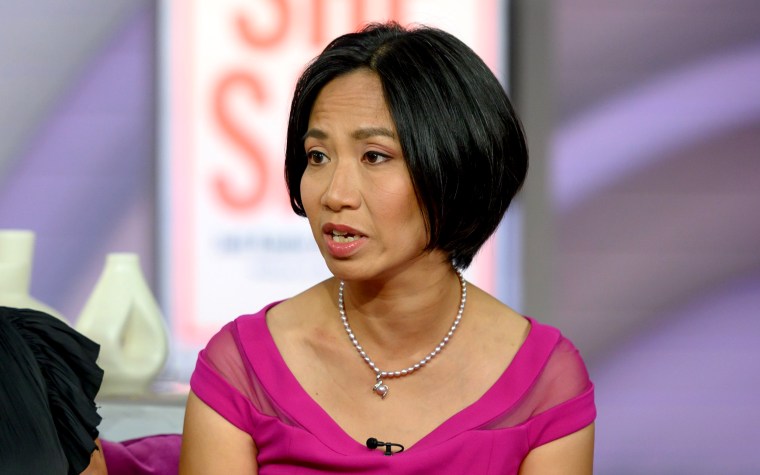Rowena Chiu, Harvey Weinstein's former assistant who accused him of sexual assault, says she feels "some measure of justice" after the film executive was convicted of rape in a landmark trial of the #MeToo era.
Chiu, who alleges Weinstein told her he "never had a Chinese girl" before attacking her during the Venice Film Festival in Italy in 1998, said in an interview that it's "obviously a very emotional day, bringing closure to a 22-year fight to me and many others."
"For those of us who weren't able to press criminal charges or to bring our own civil case, this criminal trial in Manhattan has represented a proxy for our own actions that we weren't able to bring," she said. "To some extent, we lived vicariously through the six brave women who took the stand."
Chiu, who wrote about her alleged experience in October in an op-ed in The New York Times titled "Harvey Weinstein Told Me He Liked Chinese Girls," was among the many women who have accused him of assault but were unable to bring criminal charges because of statutes of limitations.
The former film mogul was found guilty of third-degree rape, as well as a count of criminal sexual act in the first degree, but he was found not guilty on two counts of predatory sexual assault and a count of first-degree rape. The jury of seven men and five women deliberated for five days.
"I feel some measure of justice," Chiu said. "Guilty on all counts would've been the preference, of course, but I don't wish to undermine the significance of this verdict for many, many women around the world, not just the hundred-plus survivors who themselves sacrificed a lot personally to speak out about Harvey, but also the whole army of journalists, publicists, PR people, politicians, lawmakers that got behind the #MeToo movement."
Chiu, who was Weinstein's first East Asian accuser, has been vocal about how the intersections of race and gender, in addition to a variety of other dynamics, played into her story. She said that when The Times broke the Weinstein story in 2017, exposing decades of sexual misconduct and harassment accusations, she was not prepared to speak out, in part because of cultural pressures. Now, on the day the verdict had been handed down, she found herself in a "very different position."
"Today, it's the counter-opposite in the sense that I'm more able to speak out. ... It feels great that my voice is an Asian voice speaking out, you know, among the many other voices today. I feel there's representation," she said. "It is important today, it is important today that the women who speak out about the verdict represent many different economic situations, many different countries, many different races."
Chiu previously said the stereotypes attached to Asian women helped fuel Weinstein's alleged abuse of her while Chinese cultural values and taboos further made it difficult to process and speak out about the experience. She explained that while the legal constraints, particularly the stifling nondisclosure agreement she was pressured to sign after she attempted to report the alleged attack, kept her from revealing her story, the personal constraints were "a lot stronger."
"I hadn't talked to my family. I hadn't talked to my husband. I hadn't talked to my sister. I hadn't talked to my network of friends. No one from that time in my life in '98 knew what really happened to me."
And before the alleged attack, Weinstein weaponized Chiu's race, diminishing her to a two-dimensional, exotic trope, she said.
"My ethnicity initially marked me as different and inferior: He assured [then-colleague Zelda Perkins] that he wouldn't harass me because he didn't, as I remember it, 'do Chinese or Jewish girls,'" Chiu wrote in her op-ed. "Then later, he turned around and defined me in terms of sexual exoticism, telling me, just before he tried to rape me, that he'd never had a Chinese girl."
Sung Yeon Choimorrow, executive director of the National Asian Pacific American Women's Forum, has previously said the erroneous sexually deviant and submissive stereotypes attached to Asian women have come at a cost to their safety and equity in sexual situations.
"The stereotypes play into the culture and assumption about what men feel like they can do with women: objectify and use women at their disposal and at their pleasure," she said.
Download the NBC News app for breaking news
A range of 21 percent to 55 percent of Asian women in the U.S. report having experienced intimate physical and/or sexual violence during their lifetimes, according to the Asian Pacific Institute on Gender Based Violence. The spectrum is based on a compilation of studies of disaggregated samples of Asian ethnicities in local communities. In contrast, 33 percent of all women in the U.S. experience sexual violence.


